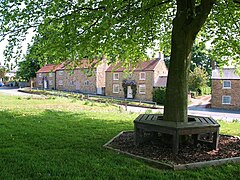Oulston
| Oulston | |
|---|---|
 Village Green in Oulston, North Yorkshire |
|
| Oulston shown within North Yorkshire | |
| Population | 149 (Including Thornton-on-the-Hill. 2011) |
| OS grid reference | SE54726 |
| Civil parish |
|
| District | |
| Shire county | |
| Region | |
| Country | England |
| Sovereign state | United Kingdom |
| Post town | YORK |
| Postcode district | YO61 |
| Police | North Yorkshire |
| Fire | North Yorkshire |
| Ambulance | Yorkshire |
| EU Parliament | Yorkshire and the Humber |
| UK Parliament | |
Oulston is a village and civil parish in Hambleton district of North Yorkshire, England. It lies about three miles north-east of Easingwold. Remains of a Roman villa have been found in the area. The village is within the Howardian Hills Area of Outstanding Natural Beauty
The village name may be derived from the Anglian personal name of Ulf combined with tun meaning habitation.
There are the remains of a Roman villa nearby, consistent with the village's location near the junction of two old Roman roads. Articles from the site are located within the York Museum.
The village is mentioned in the Domesday Book as Uluestan and at the time of the Norman invasion, the lands were owned by Gospatric, son Arnketil. Following the Norman invasion of Britain, the estates of Yearsley, Coxwold and Oulston fell into the hands of a Norman family whose previous seat of power had been in Montbray, Normandy. By 1158, however, these same lands had been given to another Norman lord whose family base had been Colleville on the Normandy coast. In return for receiving these lands, Thomas de Colville had to swear allegiance to Roger de Mowbray. Thomas de Colville’s estate included the manors of Yearsley, Coxwold and Oulston as well as other properties and land in York, Thirsk, Everley, Nunwick, Ripon, Kilburn and Upsland. The Colville shield is proudly displayed at one of the roof intersections in the twelfth century Norman church at Coxwold. A fourth Thomas Colville generously allowed John, the Prior of Newburgh, to live “by suit of court” in his manor house at Oulston. In return for Thomas’s generosity, John (besides offering prayers) used his influence, in 1256, to arrange a special privilege for Thomas: Thomas would no longer be required, on behalf of the king, to carry out any legal or other administrative duties against his will. The lands were eventually passed to the Fauconberg family and thence to the Wombwell family, who resided at nearby Newburgh Priory Estate.
...
Wikipedia

